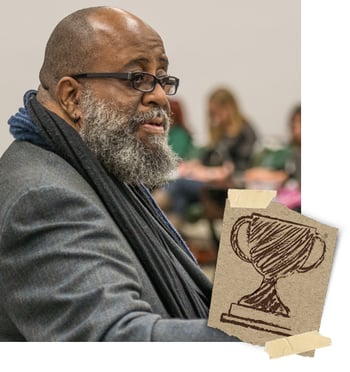Faculty voice: How slavery in the US impacts race relations today
Sociology professor Carl Taylor examines the ramifications of the slave trade.
 Carl Taylor is a sociology professor in the College of Social Science. He has extensive experience in field research aimed at the reduction of violence involving American youth. He has worked with communities, foundations and government agencies in understanding gangs, youth culture and violence. He has established a national reputation as an ethnographer and takes pride in having worked in some of the most isolated and distressed communities in the nation, giving him a strong understanding of the problems facing many neighborhoods in urban America. In 2019, Taylor was honored with the MSU Community Engagement Scholarship Lifetime Achievement Award.
Carl Taylor is a sociology professor in the College of Social Science. He has extensive experience in field research aimed at the reduction of violence involving American youth. He has worked with communities, foundations and government agencies in understanding gangs, youth culture and violence. He has established a national reputation as an ethnographer and takes pride in having worked in some of the most isolated and distressed communities in the nation, giving him a strong understanding of the problems facing many neighborhoods in urban America. In 2019, Taylor was honored with the MSU Community Engagement Scholarship Lifetime Achievement Award.
How does the slave trade still impact race relations today?
It still has a tremendous impact on our entire society. Even for a person like me who has never been enslaved, I feel the ramifications in the policies and attitudes of today’s society.
It affects us from all walks of life, including the academics where you would like to think is unbiased, but the miseducation and ignorance have become engraved into our systems, leading to a second class level of citizens. And that hurts all of us to the very top.
Perhaps the best example of where we can see the ramifications is in the prison system more than any other institution. It has long been a system of oppressive, draconian attitudes and policies against people who commit all transgressions. There are some societies around the world that treat those who commit transgressions much more humanely. But here the prison system became in a sense an extension of slavery where the incarcerated are exploited over because they are simply poor.
Where do you see the most hope for the future free from the ill effects of slavery?
For years I worked on the state’s commission for juvenile justice where draconian, knee-jerk responses were common. But we have found that juveniles are not cognitive adults and the incarceration is being replaced by a system of development and education — while still locked up — but trained and supported by psychological staff.
What current issues reflect the impacts of slavery?
I am very frightened that in the midst of the pandemic and in the midst of radical police reform, there is a tendency to lock the door and throw away the key and return to a draconian past. There needs to be a consciousness not to go back to the way things are just because times are hard. It can be hard right now to tell those working in the field how to have hope because they see the reinforced myths that there are bad people, evil people who are brown, black and Asian – and all the good people are white people.
How does a history of slavery impact other battles for justice?
Women have been the most oppressed of people and that goes all the way back to slavery and still today is not addressed. Society controls women and is still mostly a male dominated society. Women are not allowed to express as much freedom as men. That is as embedded in the roots of our country as slavery.
How would you like the International Day for the Remembrance of the Slave Trade and its Abolition to be recognized?
I believe we need to infuse our education and history with humility so as not to create an “us versus them” division. This is not a holiday. It is not about revenge but about education. We need our institutions to advocate harmonious discussions. I believe we should have not just one day but every day take an opportunity to learn from the past and not repeat it in the future. We need to give people room to digest the history and not become bitter. The lessons we need to teach are to care for our fellow man – all colors, all sizes, all religions. Divisions are what hurt us.
Originally featured on the College of Social Science's website.